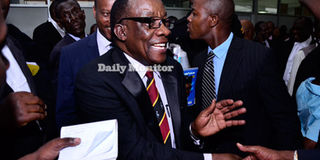Museveni, EC welcome ruling

A seemingly elated Dr Kiggundu is congratulated after the Supreme Court ruling that certified Mr Museveni’s election in the February 18 ruling in Kampala yesterday. PHOTO Eric Dominic Bukenya.
What you need to know:
The case. EC hired six lawyers to beef up its defence in a suit it was accused of flouting electoral laws
Kampala.
President Museveni’s handlers yesterday welcomed the ruling in which his contested election, described by local and international observers as not reflecting the will of the people, was upheld by all the nine justices of the Supreme Court.
Following the ruling, Presidency minister Frank Tumwebaze said yesterday, the justice had been served and the court had respected the will of Ugandans.
“Their judgment is instructive in all respects. Of great importance is the fact that President Museveni has been unanimously absolved of any wrong-doing and all the malicious allegations by anti-NRM propagandists fall flat,” he said.
Mr Tumwebaze took chance of the ruling to hit out at under-house-arrest former FDC presidential candidate Dr Kizza Besigye saying, “it dismantles his deceptive rhetoric and weird claims of election rigging.”
Uganda Media Centre executive director, Ofwono Opondo too went for Dr Besigye, saying the ruling waters down his claims of rigging before challenging the European Union, which demanded the Electoral Commission to release results of all polling stations, to name one such station with inconsistent results.
In the same vein, Mr Museveni’s legal team, was elated by the unanimous decision of the court, wearing celebratory faces after the ruling. One of them, Mr Ebert Byenkya patted his colleagues on the back for attaining the first unanimous dismissal of a presidential petition since 2001.
“It is the first time we have a unanimous decision. It is rare that you have unanimous decisions in political matters. The justices were also very specific and detailed in the summary judgment,” Byenkya said.
Electoral Commission lawyer Elison Karuhanga towed Mr Byenkya’s line in welcoming the judgment speaking of how court was awake to the public perception and went into detail to outline areas of noncompliance and their adjudication of the evidence on the same.
Speaking on behalf of Mr Badru Kiggundu after the ruling, the EC spokesman Jotham Taremwa said, “We are happy with the ruling and welcome the criticism of the court as recommendations for the future. The ruling brings to the fore the fact that the commission should have handled the challenges we faced in the process better and we humbly appreciate that guidance.”
Mr Crispy Kaheru, the coordinator of Citizens’ Coalition for Electoral Democracy in Uganda (CCEDU) in a statement, said: “The team that has received the stamp of victory should not chest-thump and use the ruling to clamp down on opponents. The essence of elections is to expand freedoms. In a democratic society, those who win an election should expect a level of provocation... the victors should not unnecessarily and unconstitutionally restrict the freedoms of their opponents on the basis that they disagree with them politically.”
CCEDU, which had applied to be part of the petition as friends of court, was ruled as having failed to fulfil the criteria of admission.
In agreement
Retired Justice John Tsekooko, who in the 2006 presidential election petition held that President Museveni’s election should be annulled, yesterday agreed with the nine judges, sating the evidence presented by Mr Amama Mbabazi’s team and his score at the presidential poll fell short of passing the substantiality test required to annul an election.
“The judgment follows what we decided in 2001 and 2006. I need time to read the ruling but on the face of it and from what I have read in the papers and from what [Mr] Mbabazi got, the irregularities could not have affected the election in a substantial manner. I agree with the court,” he said.
In 2006 Justice Tsekooko, now retired Justice George Kanyeihamba and the late Arthur Oder in a minority ruling held that the election be annulled on account of irregularities and non-compliance with the country’s electoral laws and constitution.
Mr Fred Ruhindi, the Attorney General, said: “The will of the people has been vindicated,” but agreed they [AG] would have to respect recommendations of the court in regard to instituting reforms.
Mr Eric Sabiiti, the EC head of civil litigation, said court’s criticism lays ground for improvement in the conduct and management of elections in the country.
“The ruling sets a new field for election- related jurisprudence in the country and we take the criticism in good faith,” he said.
Time line
February 18: Ugandans go to the ballot, which the Electoral Commission subsequently announced had been won by Mr Museveni with 60.7 per cent of the total valid votes cast.
March 2 : Mr Mbabazi files a petition before the Supreme Court seeking the annulment of Mr Museveni’s victory on grounds of voter bribery, ballot stuffing and electoral fraud, among other grounds.
March 7: Court starts hearing of the petition with a pre-trail conference at the Supreme Court in Kololo.
March 31: Court delivers a ruling in which the full bench of nine judges agree that Mr Museveni was dully elected President of Uganda.




